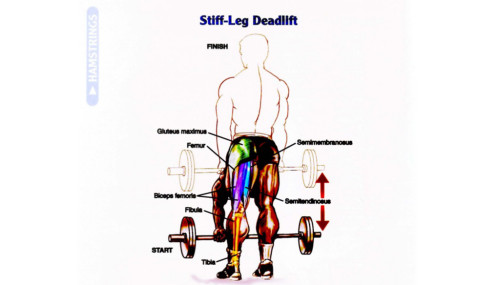Execution
1. Stand upright with feet directly below your hips, holding a barbell at arms’ length.
2. Bend forward at the waist, lowering the weight down but keeping your lep stiff.
3. Stop before the weight touches the floor, and raise It back up. Muscles Involved Prtmary: Hamstrlnp. gluteals. Secondary: Spinal erectors, quadriceps.
Anatomic Focus
Foot spacing = Position feet directly below the hips. Awide stance places more emphasis on the Inner hamstring.
Foot position: Point toes directly forward or slightly out.
Grip: Hands should be spaced shoulder-width apart so that the anns hang vertical and hands pass along the outer thighs. An over-under grip with one palm facing forward and the other facing back prevents the bar from rolling.
Trajectory: The bar should travel straight up and down, dose to the body. Body position: Knees may be slightly bent but should be kept stiff In order to isolate the hamstrings. Keep your back straight throughout the movement Performing this exercise with the balls of both feet on a half-inch-thlck (1.3 cm) weight plate is a safe way to prestretch the hamsbings.
Range of motion: lower the weight until your hamsbings reach full stretch without rounding your spine. There Is no need to perform this exercise while standing on a bench or block as a means of increasing the range of motion. When your pelvis achieves full forward tilt, the hamstrings are at full stretch. Bending your lower spine does not have any effect on the hamstrings or increase the range of downward motion. Rounding your lower spine merely increases the risk of injury. Depending on your flexibility, the barbell should be lowered to a point below your knees or just above the ankles.
Resistance: The stiff-leg deadlift for hamstrings requires a lighter weight than that used during the traditional powerlift for strengthening the lower back.



Post your comment